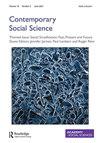COVID-19: an age of fear, simulacra, or reality?
IF 2.1
Q1 SOCIAL SCIENCES, INTERDISCIPLINARY
引用次数: 1
Abstract
ABSTRACT The present research aims to deconstruct the proclamatory discourses on COVID-19 circulating in the networks of cyberspaces. The study attempts to analyse whether the knowledge produced about the precautionary assumptions such as a lockdown or social distancing are intentionally highlighted through media and other social networks. For this purpose, the research borrows Jean Baudrillard’s concept of Simulacra and Simulation to analyse how the COVID-19 pandemic creates a sensation of unreal fear at the global level. This excessive sensation constructs a culture of exercising power that gradually replaces the real understanding of discrimination between reality and imitation. This projection of sustained discordance aligns with Baudrillard’s basic tenets of media simulation of reality, wherein a simulation process is a fabricated culture constructed by human beings that dominates nature through a reversal of commonsensical understanding about the relationship between nature and the culture that is constructed by man. Hence, whatever knowledge is consumed as a constructed entity remains a copy ad infinitum. The exploration demonstrates the stage of hyper-reality highlighted in the process of simulation and simulacra. The present analysis is interested in perusing the effects of interpenetration between the real/created media knowledge production through Baudrillard’s concept of simulation simulacra.新冠肺炎:恐惧、模拟还是现实的时代?
摘要本研究旨在解构网络空间中流传的关于新冠肺炎的宣言话语。这项研究试图分析是否有意通过媒体和其他社交网络强调关于封锁或保持社交距离等预防性假设的知识。为此,本研究借用了让·波德里亚的“模拟和模拟”概念,分析新冠肺炎大流行如何在全球范围内造成不真实的恐惧感。这种过度的感觉构建了一种行使权力的文化,逐渐取代了对现实与模仿之间区别的真正理解。这种持续不和谐的投射符合鲍德里亚对现实的媒体模拟的基本原则,其中模拟过程是人类通过颠倒对自然和人类构建的文化之间关系的常识性理解而构建的、支配自然的捏造文化。因此,任何知识作为一个构建的实体被消耗,都是无限的复制品。该探索展示了在模拟和拟像过程中突出的超现实阶段。本分析旨在通过鲍德里亚的模拟拟像概念来探究真实/创造的媒介知识生产之间的渗透效应。
本文章由计算机程序翻译,如有差异,请以英文原文为准。
求助全文
约1分钟内获得全文
求助全文
来源期刊

Contemporary Social Science
SOCIAL SCIENCES, INTERDISCIPLINARY-
CiteScore
6.40
自引率
8.30%
发文量
15
 求助内容:
求助内容: 应助结果提醒方式:
应助结果提醒方式:


